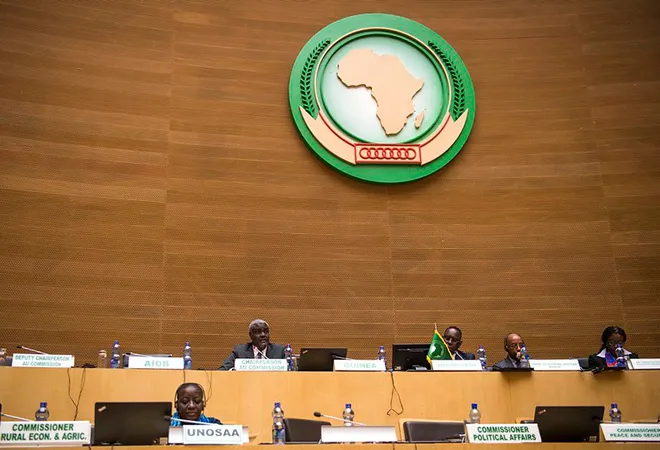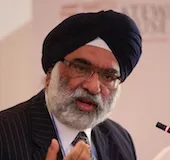
The 34
th ordinary summit of the African Union was held at its headquarters at Addis Ababa on 7 and 8 February 2021. It was the first virtual summit held during the COVID-19 pandemic, where, for the first time, it elected its Commission officials virtually under the new AU reforms.
At this summit, the regional rotation of the chair of the AU took place.
South African President, Cyril Ramaphosa, handed over the chairmanship to the
President of the Democratic Republic of Congo (DRC), Felix-Antoine Tshisekedi Tshilombo. Thus, the rotation is from Southern Africa to Central Africa. Rwandan President, Paul Kagame, had held the chair on behalf of East Africa in 2018 and Egyptian President,
Abdel Fattah el-Sisi, was chair in 2019. Next year, in 2022, West Africa will have the chair. The Senegalese President, Macky Sall, who is currently in the bureau as the first vice-chairman of the AU, is expected to be the next in line. He was endorsed by the Economic Community of West African States (ECOWAS) at their summit on 2 February 2021.
The themes of the summits are the moral compass that the AU provides to Africa.
The theme of the summit was “
Arts, Culture, and Heritage: Levers for Building the Africa We Want.” The previous summit in 2020 had “
Silencing the Guns: Creating Conducive Conditions for Africa’s Development” as the theme, while in 2019, it was “
Year of Refugees, Returnees, and Internally Displaced Persons: Towards Durable Solutions to Forced Displacement in Africa.” The themes of the summits are the moral compass that the AU provides to Africa. There is a hiatus between popular aspirations and the AU’s capabilities. The themes attempt to bridge that gap through issues that Africa expects to tackle. However, the themes remain important to give the AU a focus for its work.
The 2021 theme is inspired by
Agenda 2063 —
a shared framework for inclusive growth and sustainable Development and Aspiration 5, which believes that an Africa with a strong cultural identity, values and ethics will strengthen it. Africans could be inspired with a sense of cultural unity in diversity, a sense of a common destiny, identity, and pan-African consciousness. The aspiration also focuses on the work ethic, the role of women, and recognises traditional and religious leaders, including youth as agents of change.
Despite the efforts to silence the guns in 2020, the incidence of violent conflicts within countries and the issue of displaced people caused cross-border tensions to remain high.
The summit took place amidst the pandemic to address the need for economic and social regeneration and to implement the delayed African Continental Free Trade Area (AfCFTA). Despite the efforts to silence the guns in 2020, the incidence of violent conflicts within countries and the issue of displaced people caused cross-border tensions to remain high. South Africa as chair wanted to hold two extraordinary summits in May 2020 to launch the AfCFTA and to discuss the efforts in “Silencing the Guns.” However,
these were postponed and held virtually in November, due to the pandemic.
Among the violent crises, the Central African Republic, after its chaotic election in December, was a focal point. The AU could not agree on what to do with divided interest among its members. Angola, DRC, and Rwanda support the current president, but Chad and Congo (Brazzaville) prefer the rebels. This pits the chair, DRC, versus the AUC chairperson who is from Chad! Such are the realities that the AU faces.
The AU could not agree on what to do with divided interest among its members.
Similarly, in the Tigray crisis which Ethiopia holds as an internal law enforcement effort, the
AU troika was given short shrift by the Ethiopians leading to limiting the AUs writ. The AU envoys were Joaquim Chissano, former president of Mozambique; Ellen Johnson Sirleaf, former president of Liberia; and Kgalema Motlanthe, former president of South Africa. Similar placebos are seen in the Somalia-Kenya disagreement and the Sudan-Ethiopia border issues.
The AU made headway in
keeping the parties engaged on the Grand Ethiopian Renaissance Dam Agreement in Ethiopia. The efforts of President Ramaphosa with the AU Bureau kept the parties engaged, but the Tigrayan crisis erupted and added other dimensions to it. According to the AUC four-year performance report, it claimed success in Sudan, South Sudan, and in the Ethiopia and Eritrea issue. The
Taking Stock, Charting the Future Report did say that the
AU’s early warning system failed in preventing the Tigray crisis for instance. The continent still endures structural challenges to attain lasting peace and sustainable development.
The summit was to implement some of
the reforms established in 2016 by a committee led by Rwandan President Kagame. The reforms intended to focus
on fewer priority areas with continental scope; review the structure and operations of the AU and ensure
institutional realignment for better delivery;
connect with African people; become
operationally effective and efficient and identify and implement
sustainable financing for its programmes and reduce dependence on development partners. An
African Union levy of 0.2 percent on eligible imports to finance AU activity was invoked.
Since the chairman was elected unopposed for the first time in AU history, the reforms impacted the elections for the deputy chairperson and the six commissioners.
The three visible reforms are that the summit is now held once a year rather than twice (extraordinary summits can be called); the AU commission was reduced in size from ten to eight by merging the role of four commissioners into two. And the partner countries were no more invited to the summit since they were seen as distracting African leaders from the summit.
Since the chairman was elected unopposed for the first time in AU history, the reforms impacted the elections for the deputy chairperson and the six commissioners. When the total Commission was 10, then each region got two AU posts but now the reduction means that regional rotation will be over two or more terms. Rwandan banker and minister, Dr Monique Nsanzabaganwa, won the post of deputy chairperson becoming the first woman to hold the position. She warded off the challenge of two other women, since under the reforms either the AU Chair or deputy chair must be a woman. Earlier, this gender balance only applied to the eight commissioners. The top two positions are elected by the Assembly of Heads of State of the AU.
Under the new rules, there ought to be a gender and regional balance but this could only be determined once the assembly elected the top two.
The commissioners are elected by the Executive Council of Foreign Ministers. Under the new rules, there ought to be a gender and regional balance but this could only be determined once the assembly elected the top two. As the chairman is from Central Africa and the deputy is from East Africa, these regions could not have a candidate and all nominees for commissioners from these regions were automatically disqualified.
The Executive Council on 6 February 2021 elected the following commissioners:
• Amb Bankole Adeoye, a Nigerian diplomat was elected to head the combined Political Affairs, & Peace and Security
• Josefa Sackoa, from Angola, was re-elected for Agriculture, Rural Development, Blue Economy, and Sustainable Environment
• Amb Albert Muchanga, a Zambian diplomat was re-elected to head the combined Economic Development, Trade, Industry, and Mining
• Dr Amani Abou-Zeid, from Egypt, was re-elected to head Infrastructure and Energy
Elections for the posts of Commissioner for Health, Humanitarian Affairs, and Social Development and Commissioner for Education, Science, Technology, and Innovation were postponed to the next meeting of the Executive Council as no candidates fulfilling the gender and regional balance were available. The long hold of Algeria over the Peace and Security portfolio was broken, but Egypt continues its hold over the Infrastructure portfolio. The rest are quite well rotated.
The reforms aimed to enhance the transparency and merit of the Commission selection process. A panel of eminent Africans carried out the pre-selection process for the Commission.
The principles were based on equitable regional representation, gender parity, predictable rotation, attracting and retaining Africa’s top talent, accountable and effective leadership and management, and transparent and merit-based selection.
The remit of the AU still does not run into solving problems, which its members do not want AU to be involved in.
By September 2020, 89 candidates were nominated for the six commissioner positions and four candidates for the deputy chairperson. A panel of eminent persons examined them to see if they were suitable on the basis of skills and competency; the panel produced a vetted final list of candidates on whom voting took place. Only eight women candidates were shortlisted among the final 25, impacting the desired gender parity. The list was short-circuited by the elections of the chair and deputy chair, thus removing East and Central African candidates from contention. The list did not have enough candidates from the other regions nor did it achieve adequate gender parity. These positions will be filled after fresh nominations and vetting.
The AU is trying to hold its own with the reforms. It is trying to be more efficient and transparent. However, the reforms are more technocratic than political. The remit of the AU still does not run into solving problems, which its members do not want AU to be involved in. This leaves it as the institution that does what it can, when it is allowed to do so! There is much hope attached to it for dealing with Africa-wide issues like the pandemic, but it needs a better coordinated bureau like what was attempted by South African President Ramaphosa as the chair.
The views expressed above belong to the author(s). ORF research and analyses now available on Telegram! Click here to access our curated content — blogs, longforms and interviews.



 The 34th ordinary summit of the African Union was held at its headquarters at Addis Ababa on 7 and 8 February 2021. It was the first virtual summit held during the COVID-19 pandemic, where, for the first time, it elected its Commission officials virtually under the new AU reforms.
At this summit, the regional rotation of the chair of the AU took place.
The 34th ordinary summit of the African Union was held at its headquarters at Addis Ababa on 7 and 8 February 2021. It was the first virtual summit held during the COVID-19 pandemic, where, for the first time, it elected its Commission officials virtually under the new AU reforms.
At this summit, the regional rotation of the chair of the AU took place.  PREV
PREV


